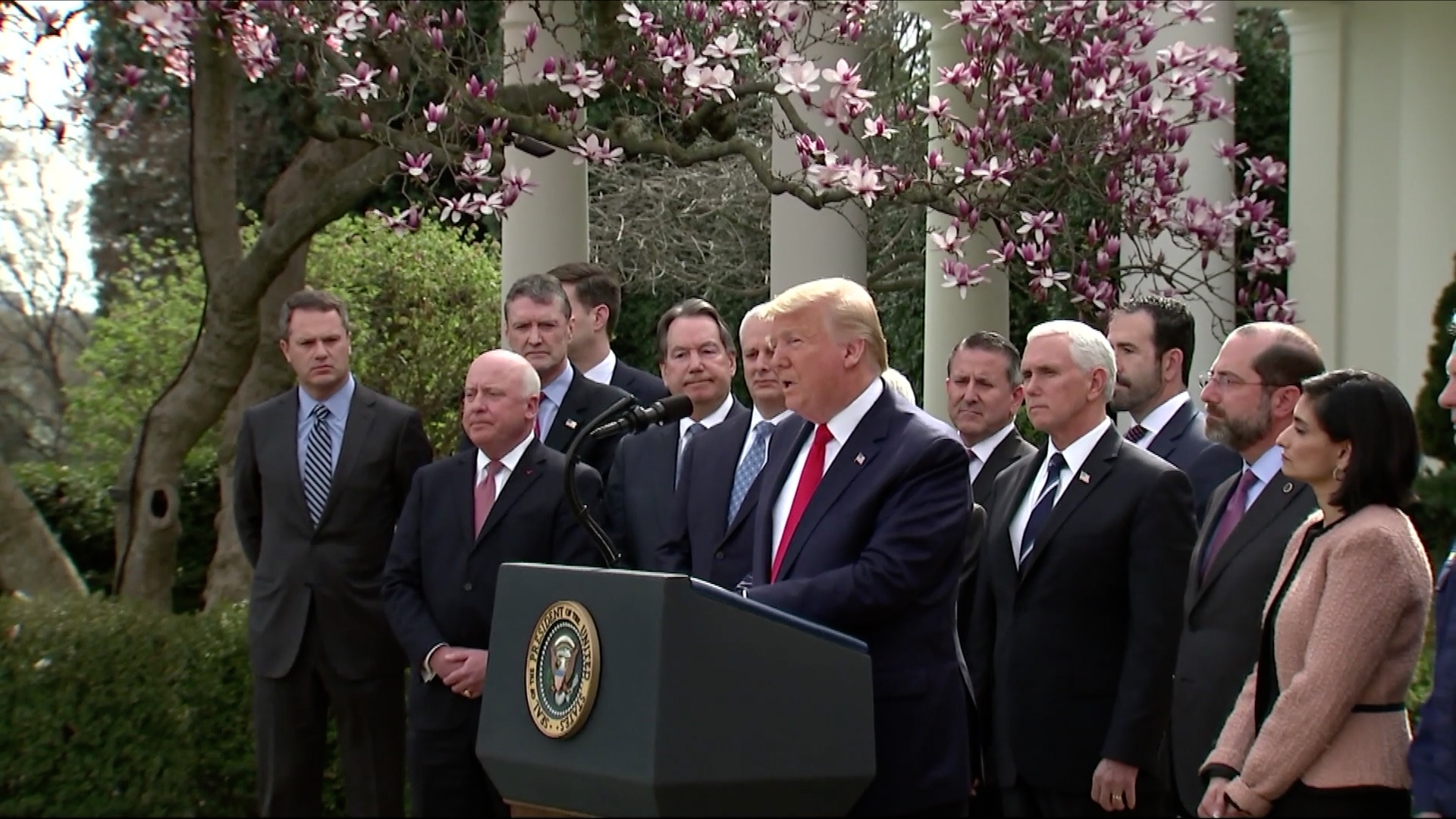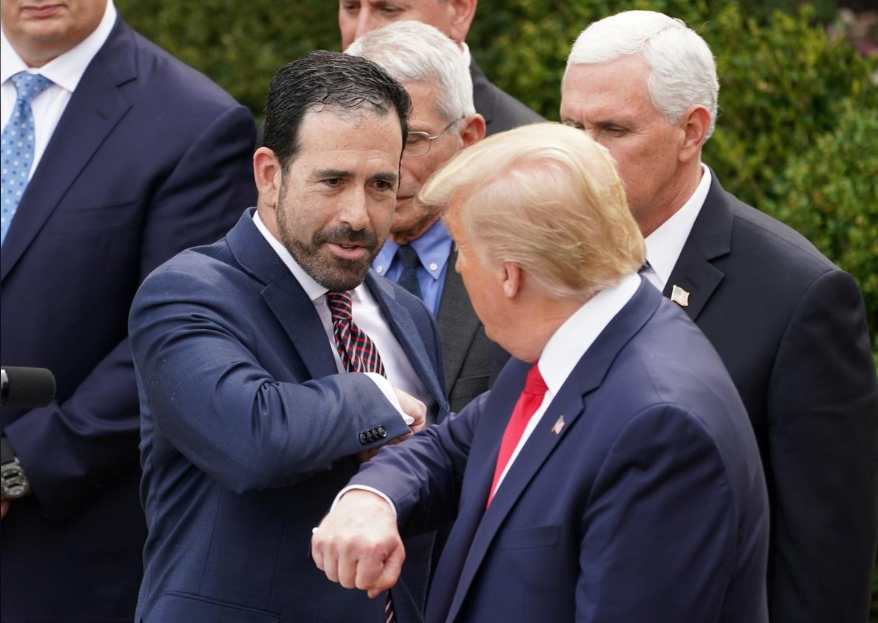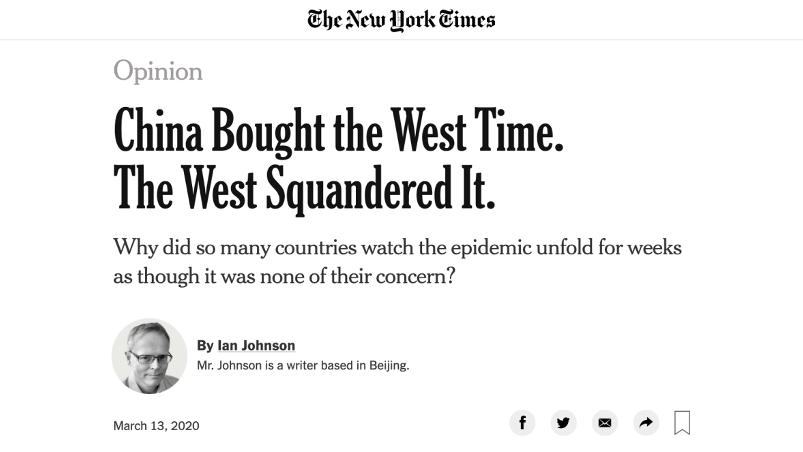01:22

U.S. President Donald Trump declared a national emergency over the COVID-19 pandemic. On Friday, Trump said the emergency declaration will open up 50 billion U.S. dollars of government funds to assist states, territories and localities.
Trump also announced a partnership with the private health sector to create more test kits and that drive-through testing centers will be open in certain areas where people can get swabbed for the virus without having to leave their automobiles.
The U.S. president also said the government is waiving interest on student loans owed to federal agencies until further notice and that the U.S. will also buy "large quantities" of oil for reserves.

Bruce Greenstein, Executive Vice President and Chief Strategy and Innovation Officer of the LHC Group offers U.S. President Donald Trump (R) an elbow bump in place of a handshake for safety at the news conference in the Rose Garden of the White House in Washington, U.S., March 13, 2020. /Reuters
Bruce Greenstein, Executive Vice President and Chief Strategy and Innovation Officer of the LHC Group offers U.S. President Donald Trump (R) an elbow bump in place of a handshake for safety at the news conference in the Rose Garden of the White House in Washington, U.S., March 13, 2020. /Reuters
Earlier on Friday, the World Health Organization warned that Europe "has now become the epicenter" of the pandemic.
The governor of Miami, Florida announced he has tested positive for COVID-19 after attending a Florida event with an aide from Brazil's government. Trump and Vice President Mike Pence were pictured standing next to the Brazilian president's communications secretary Fabio Wajngarten, who later tested positive for the virus. So far Trump has not been tested for the virus according to the White House.
As more research is being carried out on COVID-19, scientists are discovering just how dangerous the virus can be. It's been discovered that coronavirus can stay infectious for days on certain surfaces, whereas it was previously thought that it could only survive for hours outside the body. Scientists now believe that the virus can stay in a patient's body for many weeks.

U.S. House Speaker Nancy Pelosi delivers a statement on a coronavirus economic aid package ahead of a vote in the House of Representative on Capitol Hill in Washington, U.S., March 13, 2020. /Reuters
U.S. House Speaker Nancy Pelosi delivers a statement on a coronavirus economic aid package ahead of a vote in the House of Representative on Capitol Hill in Washington, U.S., March 13, 2020. /Reuters
Pelosi: Deal on coronavirus relief bill reached
On Friday, House Speaker Nancy Pelosi said Democrats in the House of Representatives have reached a deal with Trump administration on a coronavirus aid package and will soon pass it.
"We are proud to have reached an agreement with the administration to resolve outstanding challenges, and now will soon pass the Families First Coronavirus Response Act," Pelosi said in a statement.
Pelosi and Treasury Secretary Steven Mnuchin have been negotiating since Thursday on a multi-billion dollar package that aims to limit the economic fallout from the pandemic.
The bill would provide free coronavirus testing and two weeks of paid sick and family leave for those affected by the virus, according to a summary released by Pelosi's office.
As Trump declared a national emergency the same day freeing up 50 billion U.S. dollars in federal aid, Pelosi said the House will begin work on a third emergency package after passing this.

Screenshot of the article.
Screenshot of the article.
'China bought the West time. The West squandered it'
While Trump spoke highly of China's measures battling against the virus, an opinion piece published in The New York Times on Friday challenged the West countries' reactions to the epidemic.
"Why did so many countries watch the epidemic unfold for weeks as though it was none of their concern?" Ian Johnson raised a query in his article.
"The attitude toward the coronavirus outbreak in the United States and much of Europe has been bizarrely reactive," Johnson wrote.
"It's as if China's experience hadn't given Western countries a warning of the perils of inaction," read the article, adding that many governments often turned a blind eye to the best of measures China put in place.
(Cover: U.S. President Donald Trump (R) declares the coronavirus pandemic a national emergency as Vice President Mike Pence listens during a news conference in the Rose Garden of the White House in Washington, U.S., March 13, 2020. /Reuters)
(With input from agencies)